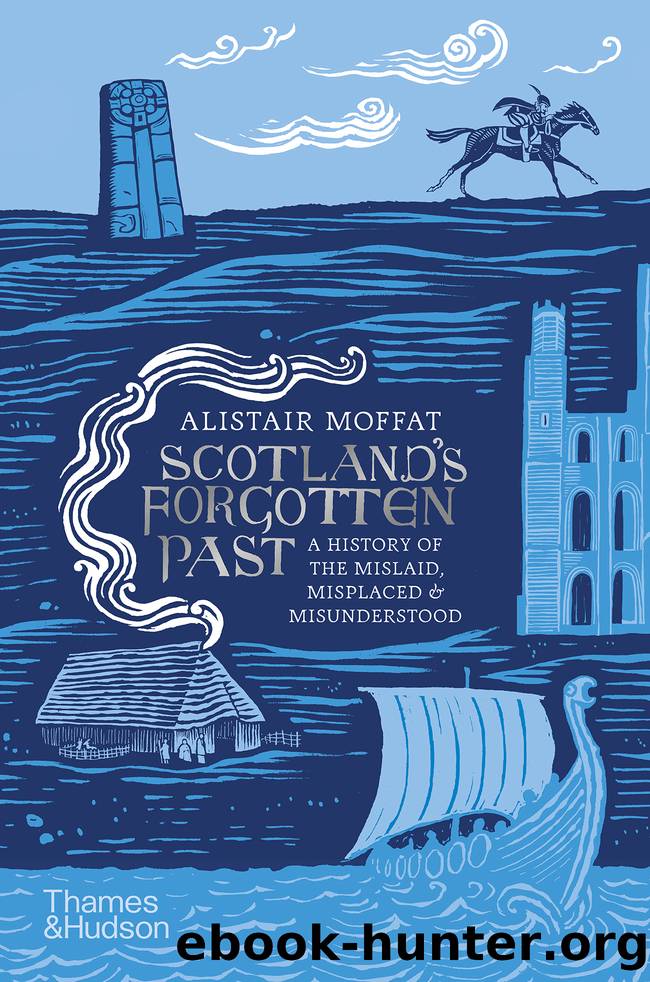Scotland's Forgotten Past by Alistair Moffat

Author:Alistair Moffat
Language: eng
Format: epub
Publisher: Thames & Hudson
Published: 2023-06-15T00:00:00+00:00
19 17007
In the first half of the 18th century, two English spies helped turn Scotlandâs history in a different direction.
In October, 1706, Daniel Defoe found lodgings on the fifth floor of Moubray House on Edinburghâs High Street. He had been sent north by Queen Anneâs chief minister, Robert Harley, to act as his eyes and ears in Scotland, to be a spy. Negotiations were under way to bring into being an Act of Union between England and Scotland, but the proposal was not popular. From the safety of his eyrie at the top of Moubray House (which still stands, next to John Knox House), Defoe watched in terror as the Edinburgh mob gathered in the street below.
âI had not been long there but I heard a great noise, and looking out I saw a terrible multitude coming up the High Street with a drum at the head of them shouting and swearing and crying out all Scotland will stand together, no union, no union, English dogs and the like ⦠I cannot say to you that I had no apprehensions ⦠particularly when part of this mob fell upon a gentleman who had discretion little enough to say something that displeased them just under my window ⦠a Scots rabble is the worst of its kind ⦠I was warned that night that I should take care of myself.â
The notion of union made every sort of economic sense for Scotland. The 1690s had seen a series of failed harvests in one of the worst periods of the Little Ice Age. There had been extreme cold and persistent rain. Famine was everywhere, and in 1698 reports of people lying dead on the roads were common. A quarter of the population of Aberdeenshire starved to death. Financial ruin also stalked the land. A vast sum, £150,000, perhaps a quarter of Scotlandâs disposable capital, was lost in the Darien scheme, an attempt to establish a Scottish colony on the Isthmus of Panama to facilitate trade with the east.
But as often in matters of national identity, heart ruled head, and the Act of Union was deeply unpopular with ordinary people. Although Daniel Defoe was sometimes terrified as well as given to panic, he did manage to gain the trust of both camps. âTis the easiest thing in the world,â he wrote, âto hire people here to betray their friends. In short, money will do anything.â
Defoe reported regularly to Robert Harley, and made only one real misjudgment. Surprisingly, he had managed to infiltrate groups of Jacobite sympathizers. Queen Anne was the last of the Stuart dynasty, and it seemed that, like Elizabeth I, she would die childless. The crown would then pass to the safely Protestant House of Hanover, even though the legitimate claim and court of James VIII and III was in exile in France. Defoe wrote that Jacobites proposed military action, âbut they found themselves too weak for the attemptâ. That may have been true in Edinburgh, but in the Highlands there was still strong support and, among many clans, a real will to fight.
Download
This site does not store any files on its server. We only index and link to content provided by other sites. Please contact the content providers to delete copyright contents if any and email us, we'll remove relevant links or contents immediately.
| General | Channel Islands |
| England | Northern Ireland |
| Scotland | Wales |
Room 212 by Kate Stewart(5102)
The Crown by Robert Lacey(4802)
Endurance: Shackleton's Incredible Voyage by Alfred Lansing(4759)
The Iron Duke by The Iron Duke(4348)
The Rape of Nanking by Iris Chang(4200)
Joan of Arc by Mary Gordon(4097)
Killing England by Bill O'Reilly(3994)
Say Nothing by Patrick Radden Keefe(3974)
I'll Give You the Sun by Jandy Nelson(3424)
Shadow of Night by Deborah Harkness(3356)
Hitler's Monsters by Eric Kurlander(3327)
Mary, Queen of Scots, and the Murder of Lord Darnley by Alison Weir(3194)
Blood and Sand by Alex Von Tunzelmann(3192)
Eleanor & Park by Rainbow Rowell(3149)
Darkest Hour by Anthony McCarten(3117)
Margaret Thatcher: The Autobiography by Thatcher Margaret(3073)
Book of Life by Deborah Harkness(2925)
Red Famine: Stalin's War on Ukraine by Anne Applebaum(2917)
The One Memory of Flora Banks by Emily Barr(2853)
